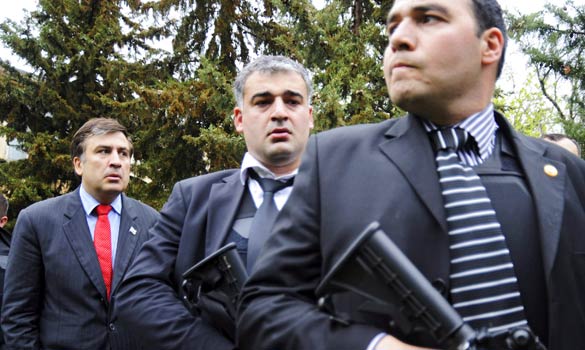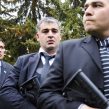
Risk Increasing of Russian Intervention in Georgia
Publication: Eurasia Daily Monitor Volume: 6 Issue: 88
By:

The situation in Georgia appears to be deteriorating rapidly. Last month the Georgian opposition parties began street protests in an effort to force President Mikhail Saakashvili to resign. Since April 9 massive rallies by opposition supporters failed to compel Saakashvili to yield, and the number of demonstrators steadily decreased. Western diplomats repeatedly urged the Georgian opposition to begin a political dialogue with the authorities, but without any results, as the radical opposition continued to demand Saakashvili’s unconditional resignation (www.civil.ge, April 28).
The stand-off continued without any serious violence until this week, when the Georgian authorities announced that they had thwarted a military coup. The Georgian Interior Ministry said that those involved in the plot had received money from Russia and were planning to disrupt the NATO military exercises, which began in Georgia on May 6 (Novosti-Gruzia, May 5). The mutiny occurred at a tank base at Mukhrovani -some 30 kilometers east of the capital Tbilisi. The rebels at Mukhrovani were surrounded by Interior Ministry Special units, with army artillery and armor, and Saakashvili arrived at the scene in a theatrical showdown -giving the rebels one hour to surrender, which they did without firing a shot. The rebel officers were arrested, while privates were disarmed. Saakashvili specifically praised the Georgian army artillery officers, who in his words not only surrounded the rebels with guns, but were also prepared to open fire and that their dedication facilitated the early capitulation (www.civil.ge, May 6).
Before the surrender, the Mukhrovani tank battalion commander issued a statement, supporting the anti-Saakashvili opposition. Russian officials quoted by RIA Novosti, dismissed the Georgian allegations of involvement in the alleged coup as a diversionary tactic to ease opposition pressure on the government, while a Kremlin official said the Georgian leader "needs to see a doctor." The radical Georgian opposition used similar language, calling the mutiny a "theatrical show" staged by Saakashvili (RIA Novosti, May 5).
However, it is clear that the Georgian Interior Ministry counter-intelligence was for some time closely monitoring the alleged coup plotters, and had its informers within their ranks. But it is also clear that the tank battalion revolt, involving hundreds of soldiers, does not seem to have been a staged event. Moscow was already known to have been seeking ways to penetrate the Georgian military to recruit agents that could help establish a pro-Russian regime in Tbilisi.
Last August in Poti, one week after Moscow accepted a French-brokered ceasefire, Russian soldiers took around 20 Georgian troops prisoner and commandeered U.S. Army Humvees that were awaiting shipment back to the United States following antiterrorist exercises with Georgian troops in July 2008. The deputy chief of Russia’s General Staff, General Anatoly Nogovitsyn announced that the U.S. Army Humvees were "military trophies" and that the Russian military were investigating the Humvees’ "very interesting" electronic equipment (Interfax, August 26).
The Georgian soldiers captured in Poti were handed back in exchange for the release of General Roman Dumbadze, who in 2004 as commander of Georgian army brigade in Batumi openly supported the pro-Russian separatist leadership in the autonomous republic of Ajara against the Saakashvili government. In 2006, Dumbadze was sentenced to 17 years in prison for treason by a Georgian court (Interfax, August 28). Aslan Abashidze -the warlord that ruled Ajara from 1992 to 2004- is in exile in Moscow together with Dumbadze and other pro-Russian Georgian exiles that could be used in the future to form a military-backed pro-Russian government. Despite repeated American protests, the Russian military did not return the Humvees. The Georgian Interior Ministry announced that the alleged coup plotters were conspiring to bring Abashidze back to Georgia (www.civil.ge, May 5).
After the abortive military coup fizzled out, the Georgian opposition provoked clashes with police on May 6, by attempting to storm the police department headquarters in Tbilisi to free three activists, who were arrested a day before for allegedly assaulting a government TV journalist. The clash left over 20 protesters and six police officers injured. Further sporadic clashes were reported from Tbilisi and consequently any peaceful political reconciliation between the authorities and opposition seemed increasingly distant (Novosti-Gruzia, Interfax, May 7).
With the internal military rebellion thwarted the outcome of a possible violent clash between the government and the radical opposition may be decided by Russia, which might choose to become militarily involved. Since mid-April Russian forces were poised on the ceasefire line in South Ossetia and Abkhazia as well as its marines on landing ships offshore in the Black Sea for a possible intervention (EDM, April 16). The troops and tanks are deployed for immediate action, but have been waiting, apparently for events in Georgia to unravel, provoking violence and destabilization.
Moscow has angrily denounced the NATO peacekeeping exercises in Georgia as a "provocation" (EDM, April 23). Last week Russian Federal Security Service (FSB) border guards were rushed from the North Caucasus to take up positions on the ceasefire line that Russia has unilaterally declared to be the new border (Interfax, April 30). Now any possible shooting incident on the ceasefire line will directly involve Russian soldiers, and can be used as a pretext for a new military invasion.




